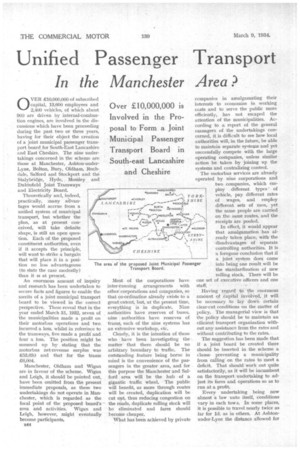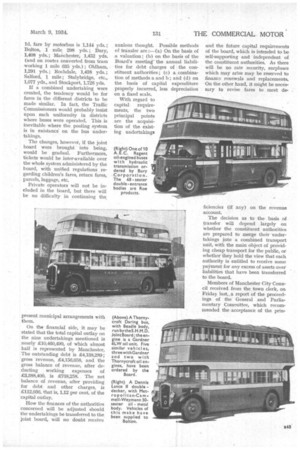Unified Passenger Transport
Page 110

Page 111

Page 112

If you've noticed an error in this article please click here to report it so we can fix it.
In the Manchester Area ?
Over £10,000,000 is Involved in the Proposal to Form a Joint Municipal Passenger Transport Board in South-east Lancashire and Cheshire
OVER 210,000,000 of subscribed capital, 13,600 employees and 2,400 vehicles, of which about 000 are driven by internal-combustion engines, are involved in the discussions which have been proceeding during the past two or three years, having for their object the creation of a joint municipal passenger transport board for South-East Lancashire and East Cheshire. The nine undertakings concerned in the scheme are those at Manchester, Ashton-underLyne, Bolton, Bury, Oldham, Rochdale, Salford and Stockport and the Stalybridge, Hyde, Mossley and Dukinfield Joint Tramways and Electricity Board.
Theoretically and, indeed, practically, many aavan tages would accrue from a unified system of municipal transport, but whether the plan, as at present con ceived, will take definite shape, is still an open ques tion. Each of the proposed constituent authorities, even if it accepts the principle, will want to strike a bargain that will place it in a position no less advantageous (to state the case modestly) than it is at present.
An enormous amount of inquiry and research has been undertaken to secure facts and figures to enable the merits of a joint municipal transport board to be viewed in the correct perspective. These reveal that in the year ended March 31, 1932, seven of the municipalities made a profit on their motorbus operations and two incurred a loss, whilst in reference to the tramways, five made a profit' and four a loss. The position might be summed up by stating that the motorbus net-revenue surplus was
'53,930 and that for the trams :e0,004.
Manchester, Oldham and Wigan are in favour of the scheme. Wigan and Leigh, it should be pointed out, have been omitted from the present immediate proposals, as these two undertakings do not operate in Manchester, which is regarded as the focal point of the proposed board's -' area and activities. Wigan and Leigh, however, might eventually become participants.
ORPISKIPIR.
E44 Most of the corporations have inter-running arrangements with other corporations and companies, so that co-ordination already exists to a great extent, but, at the present time, everything is in duplicate. Nine authorities have reserves of buses, nine authorities have reserves of trams, each of the nine systems has an extensive workshop, etc.
Clearly, it is the intention of those who have been investigating the matter that there should be no arbitrary boundary to traffic. The outstanding feature being borne in mind is the convenience of the passengers in the greater area, and for this purpose the Manchester and Salford area will be the hub of a gigantic traffic wheel. The public will benefit, as more through routes will be created, duplication will be cut out, thus reducing congestion on the roads, duplicate rolling stock will be eliminated and fares should become cheaper.
What has been achieved by private companies in amalgamating their interests to economise in working costs and to serve the public more efficiently, has not escaped the attention of the municipalities. According to a report of the general managers of the undertakings concerned, it is difficult to see how local authorities will, in the future, be able to maintain separate systems and yet successfully compete with the large operating companies, unless similar action be taken by joining up the systems and centralizing control.
The motorbus services are already operated by nine corporations and two companies, which employ different types' of vehicle, pay different rates of wages, and employ different sets of men, yet the same people are carried on the same routes, and the receipts are pooled.
••••■
In effect, it would appear that amalgamation has already taken place, with the disadvantages of separate controlling authorities. It is • a foregone conclusion that if a joint systhm does come into being one result will be the standardization of new rolling stock. There will be one set of executive officers and one staff.
Having 'regard to the enormous amount of _capital involved, it will be necessary to lay down certain clear-cut conditions on the matter of policy. The managerial view is that the policy should be to maintain an efficient transport organization without any assistance from the rates and without contributing to the rates.
The suggestion has been made that if a joint board be created there should be inserted in the scheme a clause preventing a municipality from calling on the rates to meet a deficit. That should work out quite satisfactorily, as it will be incumbent on the transport undertaking to adjust its fares and operations so as to run at a profit.
Every undertaking being now almost a law unto itself, conditions vary in each tow a. In some places, it is possible to travel nearly twice as far for Id. as in others. At Ashtonunder-Lyne the distance allowed for
id. fare by motorbus is 1,144 yds.; Bolton, 1 mile. 298 yds. ; Bury, 1,408 yds.; Manchester, 1,452 yds. (and on routes converted from tram working 1 mile 635 yds.) ; Oldham, 1,291 yds. ; Rochdale, 1,438 yds. ; Salford, 1 mile ; Stalybridge, etc., 1,077 yds., and Stockport, 1,726 yds.
If a combined undertaking were created, the tendency would be for fares in the different districts to be made similar. In fact, the Traffic Commissioners would probably insist upon such uniformity in districts where buses were operated. This is inevitable where the pooling system is in existance on the bus undertakings.
The changes, however, if the joint board were brought into being, would be gradual. Furthermore, tickets would be inter-available over the whole system administered by the board, with unified regulations regarding children's fares, return fares, parcels, luggage, etc.
Private operators will not be included in the board, but there will be no difficulty in continuing the present municipal arrangements with them.
On the financial side, it may be stated that the total capital outlay on the nine undertakings mentioned is nearly £10,460,490, of which almost half is represented by Manchester. The outstanding debt is £4,138,289; gross revenue, £4,156,058, and the gross balance of revenue, after deducting working expenses of £3,388,400, is 2768,258. The net balance of revenue, after providing for debt and other charges, is £112,936, that is, 1.12 per cent, of the capital outlay.
How the finances of the authorities concerned will be adjusted should the undertakings be transferred to the joint board, will no doubt receive anxious thought. Possible methods of transfer are :—(a) On the basis of a valuation (b) on the basis of the Board's meeting the annual liabilities for debt charges of the constituent authorities ; (c) a combination of methods a and b; and (d) on the basis of capital expenditure properly incurred, less depreciation on a fixed scale.
With regard to capital requirements, the two principal points are the acquisition of the existing undertakings and the future capital requirements of the board, which is intended to be self-supporting and independent of the constituent authorities. As there will be no rate security, surpluses which may arise may be reserved to finance renewals and replacements. On the other hand, it might be necessary to revise fares to meet de
ficienclea (if any) on the revenue account.
The decision as to the basis of transfer will depend largely on whether the constituent authorities are prepared to merge their undertakings into a combined transport unit, with the main object of providing cheap transport for the public, or whether they hold the view that each authority is entitled to receive some pakment for any excess of assets over liabilities that have been transferred to the board.
Members of Manchester City Council received from the town clerk, on Friday last„a report of the proceedings of the General and Parliamentary Committee, which recommended the acceptance of the prin ciple of the formation of a joint municipal board, "with such variation or modification as further investigation may show to be desirable."
The committee states that by the merging of nine separate undertakings into one system, as proposed, considerable economies would be achieved, notwithstanding increased costs which might be expected as a result of levelling up wages of the operating staffs and the extension of superannuation provisions to employees who do not, at present, enjoY such benefits. Local control of traffic would, it may be anticipated, continue as at present, to a large extent, but more co-ordination would be possible if the undertakings were merged.
The authorities concerned are, in the first place, now asked to say whether or not they approve of the principle of the joint board. If the principle be accepted, the next step will -be for a conference of representatives of . the municipalities to prepare, for the subsequent approval of the authorities,.a scheme which would form the basis of a Bill to be promoted in Parliament. That Bill would repeal the present numerous enactments of the authorities in relation to the several transport undertakings and substitute a code of legislation for the constitution of the joint board.
Assuming that the principle of the formation of the board is accepted by all the undertakings, or a sufficient number of the municipalities as• would ,justify further steps being taken to establish a board, there is a
number of important questions which will call for decision prior to the submission of a Bill to Parliament, inchiding :— (1) The basis of transfer of the undertakings to the Board. This question raises the issue : Are the various local authorities prepared to merge their undertakings into a combined unit of transport with the main objective of providing cheapness of service to the public, or, alternatively, do they hold the view that each authority is entitled to receive some payment for any excess of assets over liabilities transferred tc the board?
(2) Representation on the Board.
(3) Method of raising capital. (4) Application of net surplus revenues. (5) Policy in relation to contributions to and from the rates.












































































































































































